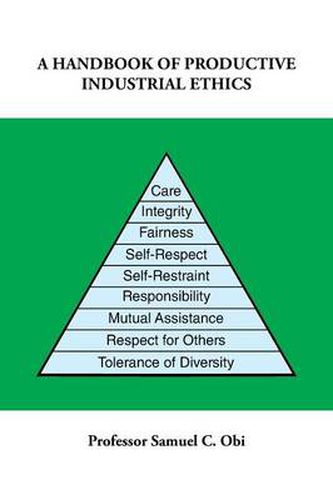Readings Newsletter
Become a Readings Member to make your shopping experience even easier.
Sign in or sign up for free!
You’re not far away from qualifying for FREE standard shipping within Australia
You’ve qualified for FREE standard shipping within Australia
The cart is loading…






This title is printed to order. This book may have been self-published. If so, we cannot guarantee the quality of the content. In the main most books will have gone through the editing process however some may not. We therefore suggest that you be aware of this before ordering this book. If in doubt check either the author or publisher’s details as we are unable to accept any returns unless they are faulty. Please contact us if you have any questions.
A Handbook of Productive Industrial Ethics is written for all industrial workers, and also for all students who will be working in industrial environments upon graduation. The increasing need for good work ethics in industry was the major factor behind the conception of this book. American society and work environments are becoming so complex that individual workers are bombarded in different directions by ethical problems which they did not create. Too often, these workers are confused, in part, because society never really offered them the basic ethical foundation needed to respond adequately to the increasing demands of our complex world. This book is divided into six separate chapters that closely follow the different tenets of values upon which it is based. Chapter 1 (Introduction to Industrial Ethics) explains why our many industrial organizations are in their present situation. It also discusses the meanings and ramifications of ethics, and why the study of ethics is needed by everyone associated with these organizations. Chapter 2 deals with the topic of Industrial Responsibility, specifically from an industrial point of view. Chapter 3 discusses, from an organizational point of view, three key values that are closely identified with a worker as an individual: Honesty, Self-control, and Self-respect. The other critical values which the worker encounters in team or group work are covered in chapter 4, and include Fairness, Mutual Assistance, Tolerance of Diversity, and Respect for Others. To tie all the values together, the topic of Integrity is covered in chapter 5. Chapter 6 extends the ideas developed in previous chapters, by using real Case Situations to clarify misapplications of principles of industrial ethics. Samples of industrial professional codes of ethics are included as Appendices to aid readers identify with the professional ethics of their affiliated organizations.
$9.00 standard shipping within Australia
FREE standard shipping within Australia for orders over $100.00
Express & International shipping calculated at checkout
This title is printed to order. This book may have been self-published. If so, we cannot guarantee the quality of the content. In the main most books will have gone through the editing process however some may not. We therefore suggest that you be aware of this before ordering this book. If in doubt check either the author or publisher’s details as we are unable to accept any returns unless they are faulty. Please contact us if you have any questions.
A Handbook of Productive Industrial Ethics is written for all industrial workers, and also for all students who will be working in industrial environments upon graduation. The increasing need for good work ethics in industry was the major factor behind the conception of this book. American society and work environments are becoming so complex that individual workers are bombarded in different directions by ethical problems which they did not create. Too often, these workers are confused, in part, because society never really offered them the basic ethical foundation needed to respond adequately to the increasing demands of our complex world. This book is divided into six separate chapters that closely follow the different tenets of values upon which it is based. Chapter 1 (Introduction to Industrial Ethics) explains why our many industrial organizations are in their present situation. It also discusses the meanings and ramifications of ethics, and why the study of ethics is needed by everyone associated with these organizations. Chapter 2 deals with the topic of Industrial Responsibility, specifically from an industrial point of view. Chapter 3 discusses, from an organizational point of view, three key values that are closely identified with a worker as an individual: Honesty, Self-control, and Self-respect. The other critical values which the worker encounters in team or group work are covered in chapter 4, and include Fairness, Mutual Assistance, Tolerance of Diversity, and Respect for Others. To tie all the values together, the topic of Integrity is covered in chapter 5. Chapter 6 extends the ideas developed in previous chapters, by using real Case Situations to clarify misapplications of principles of industrial ethics. Samples of industrial professional codes of ethics are included as Appendices to aid readers identify with the professional ethics of their affiliated organizations.